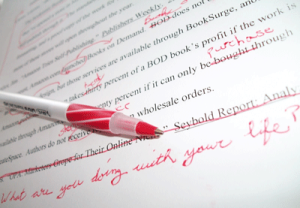Mistake # 1: Edit Your Own Book!
Spelling and Grammar – ouch!
Do you think editing is just a matter of running ‘spell-check’ on your word processing software? Think again. Do you think that you are your own best editor or that hiring a professional editor is too expensive or an unnecessary expense? Think again.
Editing your book isn’t just about correcting spelling mistakes. Even if it were, your word processor’s spell-check program won’t pick up the difference between two, to and too, or there, their and they’re. Spell-check programs won’t tell you when and when not to use possessives or when you’ve mixed pronouns. Here’s proof:
“Author’s shouldn’t do they’re own editing; their just two close to there own work.”
The sentence above contains seven obvious grammatical errors that my Word™ software failed to catch when I ran its ‘Spelling and Grammar’ tool. Were you able to catch all seven mistakes? If not, hire an editor to review your manuscript before allowing the world to read your book.
The grammatically correct sentence should read:
“Authors shouldn’t do their editing; they’re just too close to their work.”
I attended a professional conference recently; the attendees were very successful small business owners ($1 million – $30 million in annual revenue) who paid a significant registration fee to learn from cutting-edge industry leaders. In one session I listened to a supposed expert in self-publishing rant that the comments he had received from his readers about the misspellings and grammatical errors in his books were ‘petty’. He said that worrying about spelling and grammar was secondary; readers should be paying attention the valuable information he expounded instead of ‘minor’ mistakes. That statement and a few other ‘minor mistakes’ in his ‘expert’ self-publishing advice, in my eyes, greatly discredited all the otherwise valuable advice he may have given during his talk. Judging an author’s content by its mistakes may be ‘throwing the baby out with the bathwater,’ but that is precisely what many readers will do when they see spelling and grammatical mistakes in your work. They’ll throw out your great content with your mistakes. Don’t let that happen. Hire a professional editor.
 * Note: In some cases (not many) you may prefer to use what your editor may consider a grammatical error (like a reflexive pronoun) to communicate your message more effectively or prevent restricting its flow. If you’re allowing a grammatical error on purpose, you’d better be ready to explain it to your editor and you’d better be sure it works.
* Note: In some cases (not many) you may prefer to use what your editor may consider a grammatical error (like a reflexive pronoun) to communicate your message more effectively or prevent restricting its flow. If you’re allowing a grammatical error on purpose, you’d better be ready to explain it to your editor and you’d better be sure it works.
Context – Do your readers know what you’re talking about?
Another reason to hire a professional editor, even more important than catching spelling and grammatical errors, is to be sure an outside audience understands the context of your message.
What this means is that you, as the creator of your work, have a very intimate connection with it. You understand the context of your message. You may be making assumptions about the subject matter that, in your eyes, need no back-story or introduction. An outside reader, without an intimate connection to the subject matter, may have no background knowledge of information you take for granted. When you read your own work, your message looks perfectly clear and obvious (to you). When someone new to the subject or without your particular context reads your work, will they be able to understand your message?
For example: Your book, Be a Winner with Social Media tells your readers: “Make sure your Social tags include your main url and cross-check them against popular keywords.” You understand this sentence perfectly because you already know what ‘Social tags’, ‘url’s’ and ‘keywords’ are and how they work – after all, you wrote the book! But your readers, those who could most benefit from your book, have absolutely no idea what the sentence means unless you have already introduced them to the individual concepts.
An outside editor is an outside pair of eyes, with an outside perspective; she will warn you when you’re speaking in your own language rather than the language of your audience.
You want readers to read, learn and benefit from the message contained in your book. In order to do that, your message must be presented without hurdles the reader must leap in order to understand your message. Spelling mistakes, grammatical mistakes, internal language and unfamiliar terminology are all hurdles that block the path your reader is trying to follow. Allow an editor to help you take away those hurdles and pave a smooth path for your reader to follow.
What do you think about this self-publishing mistake? Any ideas? We’d love to hear from you, please comment.
About me:
I’m a self-published author. My first self-published book, Breaking the Treasure Code: The Hunt for Israel’s Oil sold about 20,000 copies … okay, I guess. Since then, between the self-publishing companies I started and bought, we’ve sold close to one million books.
Let me tell you, in the beginning, I didn’t know much about writing a book, and knew nothing about publishing, printing, marketing and selling books! If I had known anything, I might have walked away, overwhelmed with the whole process. Successfully self-publishing can, at times, seem hopeless. But I stuck to it, learned a lot about publishing, even more about marketing and selling, and, through lots of practice, sharpened my writing skills.
Even so, there are countless, landmines, booby-traps, dead-ends and just plain mistakes a self-published author can make. This is the first of ten weekly blog posts. They come from my e-book: The Ten Biggest Mistakes Self-Published Authors Make. This little book captures ten of the most common, most detrimental mistakes you can make as a self-published author and, hopefully, how to avoid them. I wanted to put these mistakes out in a blog format so you can comment, ask questions and we can discuss ways to make your book as successful as it can possibly be.
